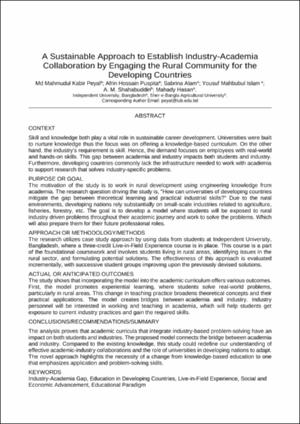A Sustainable Approach to Establish Industry-Academia Collaboration by Engaging the Rural Community for the Developing Countries

View/
Date
2023-09Author
Kabir Peya, Md Mahmudul
Puspita, Afrin Hossain
Alam, Sabrina
Mahbubul Islam, Yousuf
Shahabuddin, A. M.
Hasan, Mahady
Metadata
Show full item recordAbstract
Skill and knowledge both play a vital role in sustainable career development. Universities were built to nurture knowledge thus the focus was on offering a knowledge-based curriculum. On the other hand, the industry's requirement is skill. Hence, the demand focuses on employees with real-world and hands-on skills. This gap between academia and industry impacts both students and industry. Furthermore, developing countries commonly lack the infrastructure needed to work with academia to support research that solves industry-specific problems. The motivation of the study is to work in rural development using engineering knowledge from academia. The research question driving the study is, "How can universities of developing countries mitigate the gap between theoretical learning and practical industrial skills?" Due to the rural environments, developing nations rely substantially on small-scale industries related to agriculture, fisheries, forestry, etc. The goal is to develop a model where students will be exposed to rural industry driven problems throughout their academic journey and work to solve the problems. Which will also prepare them for their future professional roles. The research utilizes case study approach by using data from students at Independent University, Bangladesh, where a three-credit Live-in-Field Experience course is in place. This course is a part of the foundational coursework and involves students living in rural areas, identifying issues in the rural sector, and formulating potential solutions. The effectiveness of this approach is evaluated incrementally, with successive student groups improving upon the previously devised solutions. The study shows that incorporating the model into the academic curriculum offers various outcomes. First, the model promotes experiential learning, where students solve real-world problems, particularly in rural areas. This change in teaching practice broadens theoretical concepts and their practical applications. The model creates bridges between academia and industry. Industry personnel will be interested in working and teaching in academia, which will help students get exposure to current industry practices and gain the required skills. The analysis proves that academic curricula that integrate industry-based problem-solving have an impact on both students and industries. The proposed model connects the bridge between academia and industry. Compared to the existing knowledge, this study could redefine our understanding of effective academic-industry collaborations and the role of universities in developing nations to adapt. The novel approach highlights the necessity of a change from knowledge-based education to one that emphasizes application and problem-solving skills.
Collections
- 2023 [67]